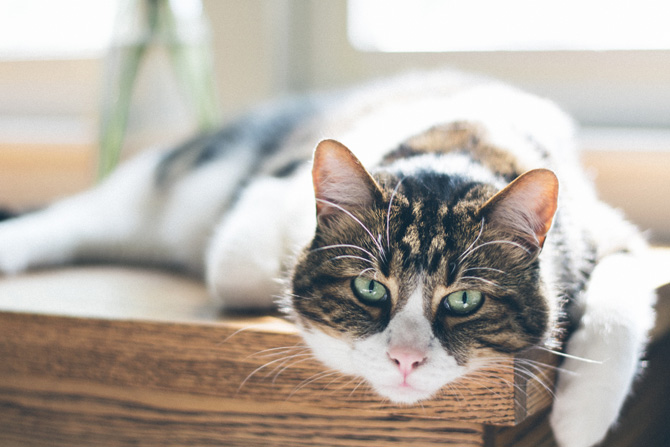When caring for a senior cat it’s important to recognise the special needs they may have. It’s also essential to be aware of the potential health risks they face and the need to give your feline friend some extra TLC.
Thankfully, the rise of indoor living for cats, advances in preventative pet care and better nutrition means that our meowing mates tend to live a lot longer than previously.
Indeed, life expectancy for cats has skyrocketed over the last 30 years. In the 1980s cats typically lived until around seven years of age. By the 1990s, the average cat lived to be approximately nine years old. Nowadays, there’s the chance our purring pals will live well into their 20s.
Signs of ageing in cats
Of course, if you want to take optimal care of a senior cat it’s good to know the key factors that influence life span. Six main factors that affect a cat’s life expectancy are:
- Diet
- Breed
- Physical health
- Genetics
- Veterinary/preventative care
- Lifestyle (whether the cat lives inside or outside)
As a pet professional, you can discuss and help highlight the changing needs of ageing cats. You can also educate clients on some of the actions they can take to help ensure their senior cat lives a happy and healthy life.
Certainly, some pet owners may not notice their cat is getting on in years. According to Cornell Feline Health Centre, common signs of ageing in cats include:
- Meowing more often
- No longer using a favourite resting place; instead, the cat may hide
- Missing or failing to use the litter tray
- Refusing to come home when called (could be linked to poor hearing)
- Changes in sleeping or eating patterns
- Becoming less active or playful
- Changes in behaviour
Caring for a senior cat: the basics
Feeding our meowing mates a nutritious and well-balanced diet, ensuring they are physically active and making sure they receive regular health checks helps support the life of cats. Additionally, it’s important to be mindful of some of the main medical problems that can affect ageing cats.
Common cat health concerns include obesity, diabetes, kidney disease, periodontal disease and heart disease. Being aware of the symptoms and risk factors can help encourage early or preventative treatment.
However, there are other considerations to advise cat parents of. Unfortunately, many cat owners are not aware of the small and practical things they can do to help their senior cat. Vets and pet sitters, in particular, are in a prime position to discuss these things with cat-owing clients.
Kitty comfort
Encourage cat parents to consider the location of their cat’s bedding. It may be helpful to move it to a quieter or less drafty place. Likewise, if a senior cat is having difficulty making it to its litter box in time, it might be beneficial to move its position or add a few extra litter trays to the home.
Furthermore, some litter boxes have quite high sides. For a senior cat with arthritis, this can make accessing the box tricky. Instead, pet owners can look for litter boxes with low sides.
Placing food and water bowls in more than one place around the home can also be helpful for a senior cat, particularly in the case of feline dementia.
Subtle assistance
Cats are creatures of comfort and a senior cat will still enjoy normal pleasures, such as lounging on his favourite windowsill or curling up on his special chair. The difference is that maybe he can’t quite jump that high any more. In this instance, you might suggest the pet owner places a small stool next to the windowsill or a pouffe beside his favourite chair. This way he can still do the things he loves, while also maintaining his independence.
Furthermore, reduced eyesight can be an issue for many senior cats. Advise owners to avoid approaching their cat from behind, as this may frighten their poor kitty. Any senior cat with vision deterioration should be kept indoors for safety reasons.
Sure, a senior cat is often set in its ways but that doesn’t mean he or she won’t enjoy some extra TLC. Keeping a predictable routine, providing gently playtime and showing some care and attention will help ensure the health and happiness of our feline friends.
What is your experience with senior cats?
Information sources:
- Cornell Feline Health Centre. Loving care for older cats. Accessed online March 2020 via: https://www.vet.cornell.edu/departments-centers-and-institutes/cornell-feline-health-center/health-information/feline-health-topics/loving-care-older-cats
- Macarthur Veterinary Group. Caring for your senior cat. Accessed online March 2020 via: https://www.macarthurvet.com.au/article/caring-for-your-senior-cat/
Latest posts by Liz Walden (see all)
- Pet health: Medicinal cannabis for pets - December 27, 2021
- What pet business insurance do I need? - November 17, 2021
- Pet sitters: how to take time off - November 15, 2021










I live in Pakenham Victoria and wandering cats particularly at night is a big problem I constantly have stray cats around my unit as I have a cat but she is indoors she’s not allowed to roam outside aimlessly and sleeps inside always people need to be responsible with their cats especially
We recommend that you report this to your local RSPCA.